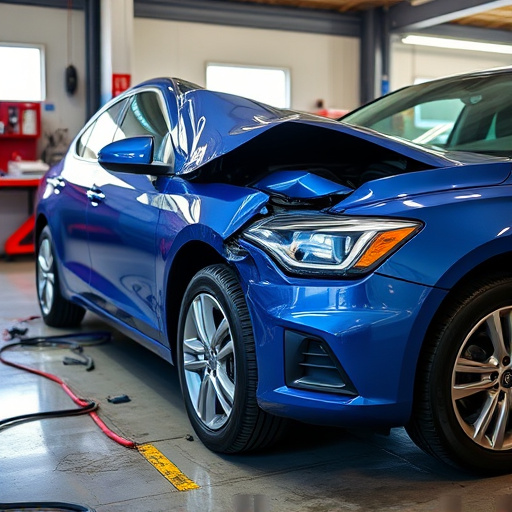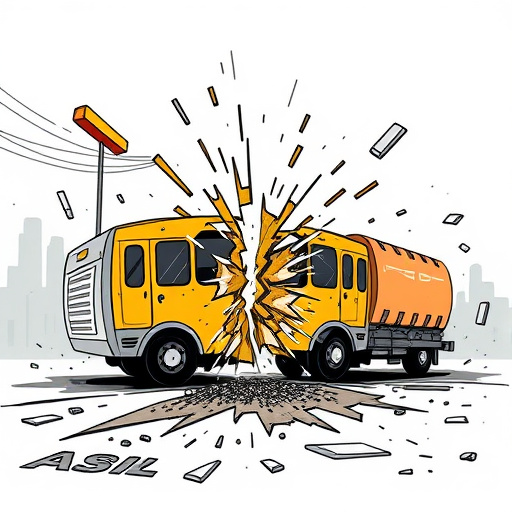Hazardous waste from industries like automotive repair poses severe risks to human health and ecosystems due to toxic properties if not properly managed. Ineffective disposal contaminates soil, water, and air, impacting communities and workers. Implementing sustainable solutions through circular economy principles, green technologies, and responsible disposal is vital for minimizing ecological degradation and safeguarding public health for future generations, emphasizing the critical need for effective hazardous waste management.
In today’s world, proper hazardous waste management is paramount for preserving our environment and public health. This article delves into the profound environmental impact of poor waste management practices, highlighting the potential risks associated with ineffective disposal methods. We explore these issues through three key sections: understanding hazardous waste, consequences of inefficient handling, and sustainable solutions for enhanced protection. By examining these aspects, we aim to underscore the importance of responsible hazardous waste management practices.
- Understanding Hazardous Waste and Its Potential Risks
- Consequences of Ineffective Disposal Methods
- Sustainable Solutions for Better Environmental Protection
Understanding Hazardous Waste and Its Potential Risks

Hazardous waste is any type of waste that poses a significant risk to human health and the environment due to its toxic, reactive, ignitable, or corrosive nature. This includes materials from various industries such as automotive body work, vehicle paint repair, and vehicle body repair, which often contain harmful chemicals like lead, mercury, and volatile organic compounds (VOCs). Improper management of these wastes can lead to severe ecological damage.
When hazardous waste is not handled, stored, or disposed of correctly, it can contaminate soil, water bodies, and air. For instance, leaks from poorly managed waste sites can infiltrate groundwater, posing risks to nearby communities and ecosystems. Additionally, the burning or incineration of such waste without adequate controls can release toxic gases into the atmosphere, contributing to air pollution. Effective hazardous waste management is crucial not only for mitigating these immediate risks but also for preserving the environment and public health in the long term.
Consequences of Ineffective Disposal Methods

Ineffective hazardous waste disposal methods can have severe environmental consequences, impacting both ecosystems and human health. When toxic substances are improperly managed, they can contaminate soil, water bodies, and air, leading to long-lasting damage. For instance, leaking dump sites or illegal burning of waste releases harmful gases and chemicals into the atmosphere, contributing to air pollution and respiratory issues in nearby communities.
In collision repair or vehicle dent repair settings, where hazardous materials like solvents and toxic paints are commonly used, inadequate disposal practices can cause significant problems. Collisions that result in damaged vehicles may expose workers and nearby residents to these substances if not handled and disposed of properly. This can lead to a range of health issues, from short-term irritations to long-term chronic conditions, underlining the critical need for strict adherence to proper hazardous waste management protocols.
Sustainable Solutions for Better Environmental Protection

Implementing sustainable solutions is paramount in the ongoing battle against environmental degradation caused by poor hazardous waste management. One effective strategy involves adopting circular economy principles, focusing on recycling, reusing, and reducing waste at its source. For instance, auto repair services can play a pivotal role by promoting the responsible disposal and recovery of materials from end-of-life vehicles, thereby minimizing the demand for virgin resources and associated environmental impacts.
Additionally, transitioning towards green technologies and practices within auto body services and car repair services is imperative. This includes the utilization of eco-friendly cleaning agents, energy-efficient equipment, and advanced waste treatment methods. By embracing these sustainable approaches, such businesses can contribute significantly to mitigating ecological harm, ensuring a cleaner and healthier environment for future generations.
Hazardous waste management is a critical aspect of environmental stewardship. The consequences of ineffective disposal methods, as highlighted in this article, underscore the urgent need for sustainable solutions. By adopting better practices and technologies, we can significantly reduce the environmental impact of hazardous waste, fostering a cleaner and safer future for all. Effective hazardous waste management not only protects ecosystems but also ensures the well-being of communities, making it a essential global priority.














